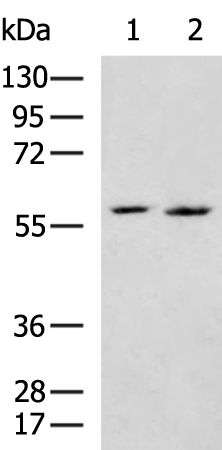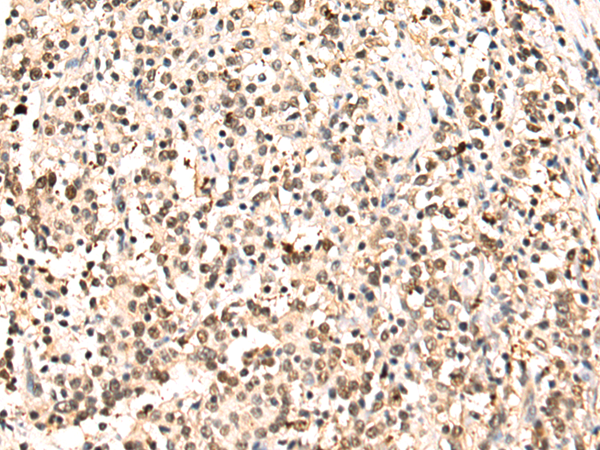

| WB | 咨询技术 | Human,Mouse,Rat |
| IF | 咨询技术 | Human,Mouse,Rat |
| IHC | 1/50-1/100 | Human,Mouse,Rat |
| ICC | 技术咨询 | Human,Mouse,Rat |
| FCM | 咨询技术 | Human,Mouse,Rat |
| Elisa | 1/5000-1/10000 | Human,Mouse,Rat |
| Aliases | TUG; ASPL; ASPS; RCC17; UBXD9; UBXN9; ASPCR1 |
| WB Predicted band size | 60 kDa |
| Host/Isotype | Rabbit IgG |
| Antibody Type | Primary antibody |
| Storage | Store at 4°C short term. Aliquot and store at -20°C long term. Avoid freeze/thaw cycles. |
| Species Reactivity | Human, Mouse |
| Immunogen | Fusion protein of human ASPSCR1 |
| Formulation | Purified antibody in PBS with 0.05% sodium azide and 50% glycerol. |
+ +
以下是关于ASPSCR1抗体的3篇参考文献及其摘要概括:
---
1. **文献名称**:*ASPSCR1-TFE3 fusion gene-specific antibodies for diagnosis of alveolar soft part sarcoma*
**作者**:Ladanyi M, Lui MY, Antonescu CR, et al.
**摘要**:本研究开发了针对ASPSCR1-TFE3融合蛋白的特异性抗体,用于免疫组化检测腺泡状软组织肉瘤(ASPS)。抗体在ASPS患者样本中显示出高敏感性和特异性,可作为该肿瘤的可靠诊断标志物。
---
2. **文献名称**:*The role of ASPSCR1 in nuclear transport and cellular proliferation*
**作者**:Kobayashi H, Fukuda M, Tanaka Y.
**摘要**:通过Western blot和免疫荧光技术,利用ASPSCR1抗体研究发现,该蛋白参与调控mRNA的核质转运,并影响细胞周期进程,尤其在癌症细胞中异常表达可能与增殖失控相关。
---
3. **文献名称**:*Overexpression of ASPSCR1 in renal cell carcinoma correlates with poor prognosis*
**作者**:Gokden N, Roth KA, Carroll SL, et al.
**摘要**:通过免疫组化分析发现,ASPSCR1在部分肾细胞癌中高表达,且与患者不良预后相关,提示其可能作为潜在治疗靶点或预后指标。
---
**备注**:若需更近期文献或具体实验细节,建议通过PubMed或Web of Science以“ASPSCR1 antibody”为关键词进一步筛选。
ASPSCR1 (Alveolar Soft Part Sarcoma Chromosomal Region Candidate 1), also known as TUG (Tether containing UBX domain for GLUT4), is a protein encoded by the *ASPSCR1* gene. It plays roles in intracellular vesicle trafficking, particularly in glucose transporter GLUT4 translocation in response to insulin, and interacts with the ubiquitin-proteasome system. Dysregulation of ASPSCR1 is linked to alveolar soft part sarcoma (ASPS), a rare cancer characterized by the chromosomal translocation t(X;17)(p11;q25), fusing *ASPSCR1* with the *TFE3* transcription factor gene. This fusion oncoprotein drives tumorigenesis by disrupting transcriptional regulation and cellular differentiation pathways.
ASPSCR1 antibodies are essential tools for studying its expression, localization, and function in both normal and pathological contexts. These antibodies, often raised in rabbits or mice, enable detection via techniques like Western blotting, immunohistochemistry (IHC), and immunofluorescence (IF). In research, they help identify ASPSCR1-TFE3 fusion proteins in ASPS diagnostics and investigate its role in metabolic disorders linked to vesicle transport defects. Commercially available ASPSCR1 antibodies vary in specificity, requiring validation for target affinity and cross-reactivity. Their applications extend to exploring ASPSCR1's involvement in other cancers, transcriptional regulation, and cellular stress responses, underscoring its dual role as a trafficking regulator and oncogenic driver.
×